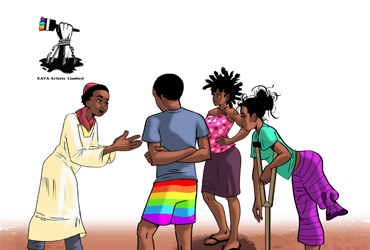The relationship between religion and the LGBTQI communities has significantly varied across time and place, within and between different faiths, concerning sexuality.
There are many different types of opposition among religious denominations that generally reject these orientations, ranging from quietly discouraging same-sex relationships, explicitly forbidding same-sex sexual practices among their adherents and actively opposing social acceptance of homosexuality, supporting criminal sanctions up to capital punishment, and even condoning homophobic murders.

Attitudes toward homosexuality are determined not only by personal religious beliefs but also by the interaction of those beliefs with the predominant national religious context, which is generally antigay.
This has denied many LGBTQI persons in Uganda the right to worship and associate freely. LGBTIQ persons find places of worship are no go areas because of the apparent religious homophobia fueled by hate preachers.
Dambisha (not real name), a 45-year-old former Teacher and a queer activist, was born and raised in the Catholic Church. He only went to Catholic Schools and joined an Islamic University in Uganda for a bachelor’s degree in Education. Like any other person with a solid religious background, Dambisha is deeply entrenched in Catholicism.
He is one of the people going to participate in next week’s launch of a campaign addressing religious homophobia in Uganda by East African Visual Artists (EAVA Artists) and partners.
“I am queer but still a staunch Catholic.
I will attend the launch because I believe it’s what God is calling me to do.” Dambisha says.
A section of religious leaders in Uganda tends to dismiss the faith of many Ugandans because they are LGBTQI persons.
“I was very upset in my teen years, with God for a very long time, mainly because of what Church individuals had done to me. But I recognized my faith and relationship with God that the things I was hearing from the pulpit and some of the things I was hearing from Church members weren’t how God saw me,” Dambisha notes.
One of the messages of the campaign is that homophobic religious leaders have no right to judge people or decide who is holy and who is not. All human beings, regardless of their sexuality, have a right to express themselves, associate, and be free in society.
We will use the campaign as part of our initiatives to reconcile faith and sexuality.
We want to inform the public that God gives us sexuality. People like Dambisha do not have to pray to God to change them because they are complete human beings created in the image of God.
We believe that despite being told by fellow believers and faith leaders that they are not allowed in society and that the Gospel is not theirs, Dambisha is a queer child of God.
It is ridiculous how individuals are conservatively and consistently using minimal text to justify the dehumanization of an entire group of individuals.
We are saying this must stop, and one of the ways to stop it is to popularize the many verses that preach love and inclusivity as opposed to the ‘verses of terror’ that are, in most cases, Holy scripture blown out of proportion.
We have interacted with faith leaders who support LGBTQI rights. In our documentary ‘A voice within’, we have put these voices together, and it will be shown at the campaign launch and accessed online.





